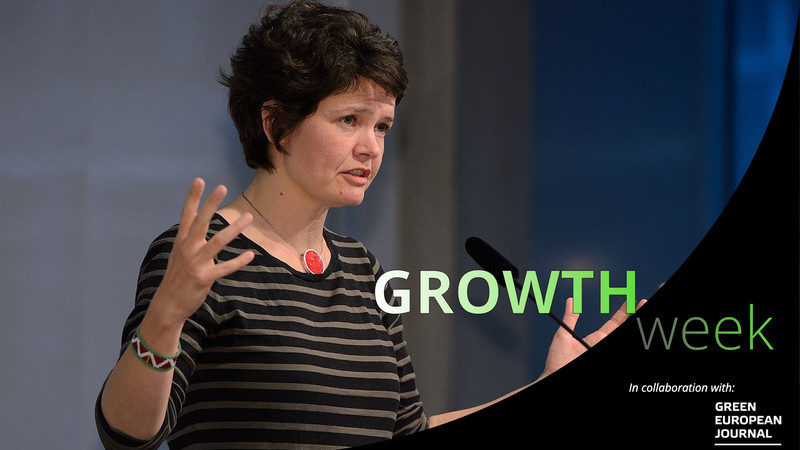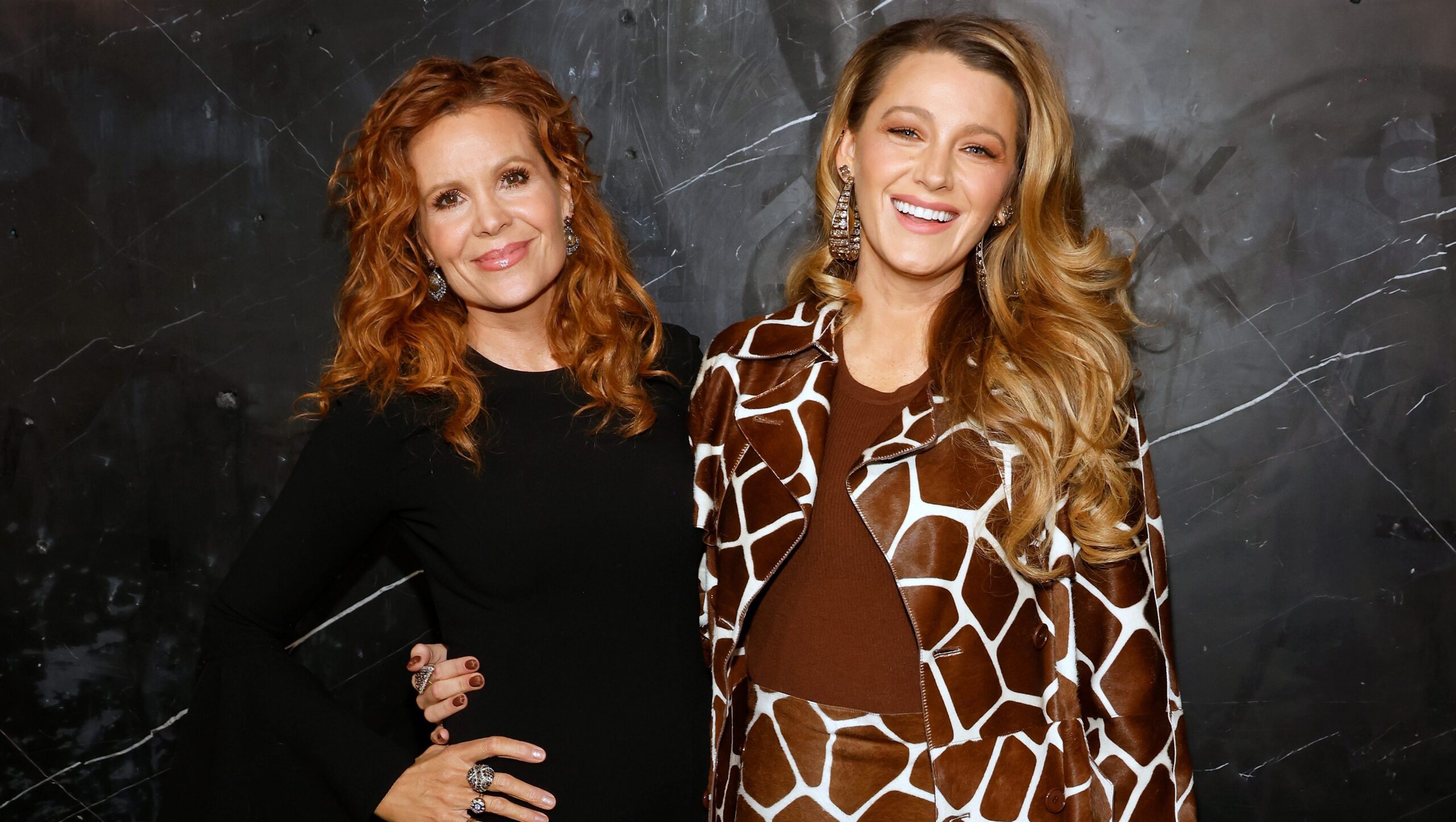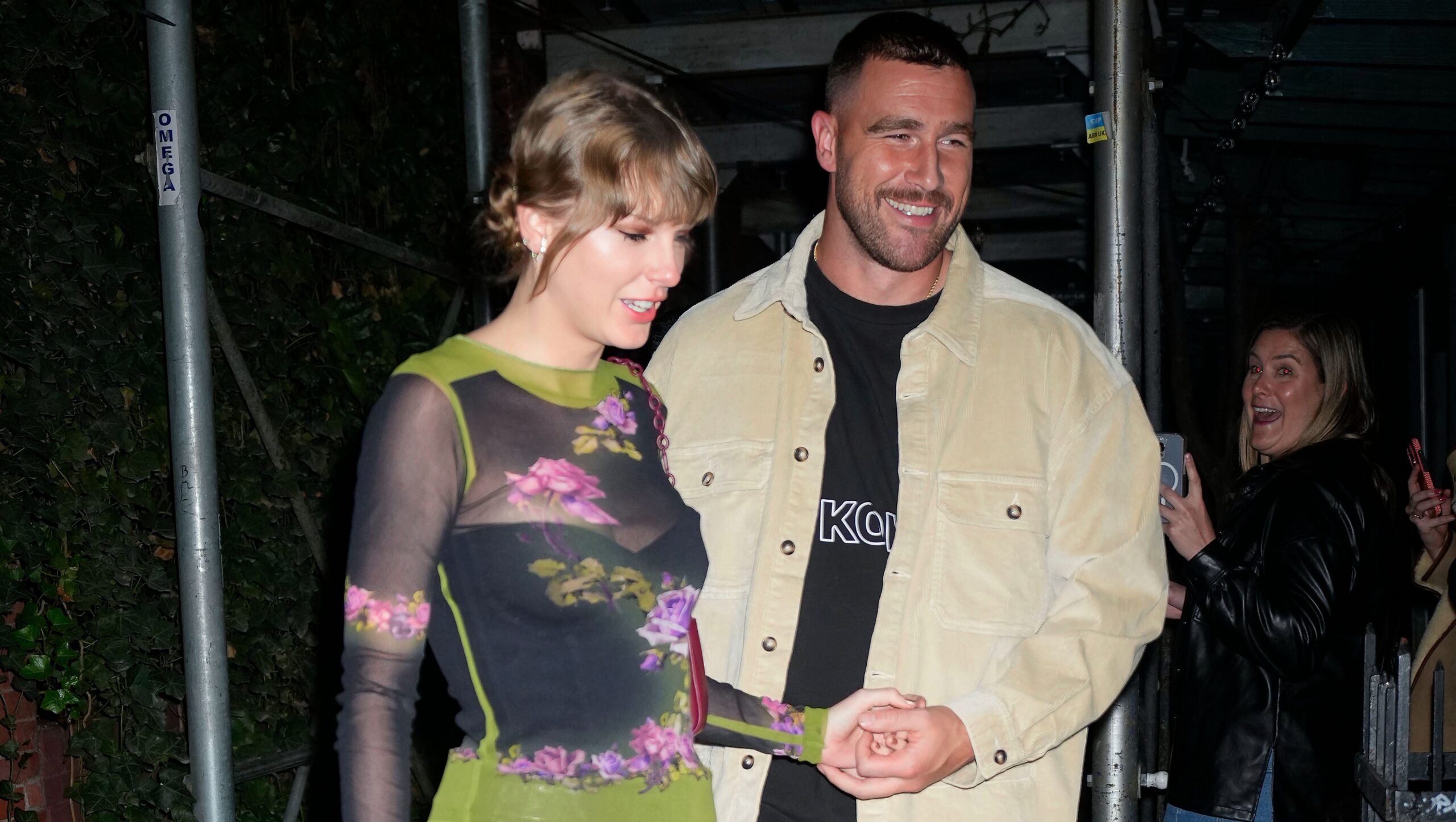EU & the World
Kate Raworth: “Boundaries Unleash Creativity”

What if the economy was not seen as an abstract construct that shapes society, but rather as a separate entity from the living planet we all call our home? What if the European Union devoted itself to meeting people’s needs while not pushing beyond the boundaries of the planet?
We sat with Kate Raworth, a renegade thinker, author of Doughnut Economics (the worldwide bestseller translated in 20 languages), to discuss prosperity beyond growth.
What would you consider prosperity to be?
Kate RaworthTim Jackson, in his book Prosperity without Growth, pointed out that prospero is a word for ‘that which we hope for’. Each person has a different idea of what prosperity is. But I think that we can all aim to create conditions for prosperity. That’s what I think the doughnut is aiming to do.
The doughnut imagines a world where everyone has the resources they need to meet their basic needs, and we do so within the limits of this living planet. Prosperity is achieved when every person has the resources to live a life full of dignity, community and opportunity while maintaining the integrity of our delicately balanced planet. This is my vision of prosperity for the 21st century.
Does Europe’s pursuit for economic growth undermine conditions for prosperity?
Let’s take a step back. Let’s take a step back. They have more resources and wealth than any human society before us. Each has an income that is around 30 times higher per person than Malawi, Tanzania, or Mozambique.
I challenge anyone to face people living in extremely low-income countries hit by the climate crisis and tell them that the only way that we, the high-income nations in Europe, can meet the needs of people in our country is to make our excessive-resource-consumption economies yet larger still. Tell that to someone who is knee-deep in floodwater, or looking at parched plants. This is a myopic view of transformation. We need to be more imaginative.
The secret to the growth of the past 100 years was cheap energy. Coal, oil, and gas allowed us to mine, heat and transform, transport, and consume so many of the earth’s natural resources. We could do all this again tomorrow. This must now be done away with. The current tragedy is that we know that the emissions from fossil fuels are destroying the web of life on which we all rely. We must therefore move to a world where we respect energy and materials much more.
I listened to politicians talk about growth when I wrote Doughnut Economics during the 2010s. In Europe, politicians would use a lot more adjectives to describe growth: “We want good and clean growth, that is resilient, lasting, fair, equitable, and smart.” All these adjectives indicate that we are aspiring for something more than just growth. Donald Trump stripped away all these adjectives, and reduced it to a call for more growth. In the United Kingdom, the debate is the exact same. It’s almost as if the more growth seems elusive, then the more obsessively the politicians pursue it.
When governments pursue growth in and of itself, they take desperate and damaging steps to achieve it. They continue to issue fossil fuel licences and open coal mines in order to chase cheap energy. They claim to be cutting red tape for business innovation but end up undermining laws that protect workers’ rights, communities, and the health of the living world. They deregulate the financial system and create speculative bubbles. They privatise services and turn public wealth to private profit.
It is important to ask ourselves, “What are we here for?” Doughnut Economics is a positive frame of reference: meet the needs and wants of all people within the limits of the living planet. It is a vision to move away from a degenerative economic system that destroys the living world and towards a regenerative economy. To move away from divisive economic systems that concentrate value in the hands a few, to distributive economies that share value and opportunities more equitably amongst all those who have contributed to its creation. This is the entire society. Europe has the chance to lead the way in demonstrating what this looks.
Growth has always been a part of the European story. Even Europe as a peace-building project was linked to economic growth. Can’t we avoid dumping the baby with the bathwater by going for green growth?
It sounds so good. Who is against green growth? It’s in their job title, or the name of their division, but it hasn’t been proven. Some European countries have decoupled GDP growth from carbon emissions, measured even on a consumption-based basis. This decoupling has now been celebrated as green growth, as if we were in a new paradigm and a new world. But it’s nowhere near what’s needed. These countries reduce carbon emissions by one to two percent per year. Climate science tells us that we need to reduce carbon emissions by eight to ten per cent each year to keep global warming below 1.5 degrees.
I tell people that if they want to catch the final train home, they’ll have to run. Not just run; sprint for your life. If you slow down, we will miss the train. This train is the stability in the climate which will affect our lives forever. In a future of hothouses, there will be no growth.
Carbon emissions are just half the story in terms of green growth. The other half of the story is the material footprint, which includes nitrogen use, land usage, water use and minerals and rare Earths. There is no decoupling of the same magnitude when you look at data about materials and GDP. Let’s not be naive about the size of the problem and get caught up in green growth. Some people believe it’s still too early to rule green growth out. I’d say that the opposite. It’s far too late to hope for it. When it comes down to it, the stability of the climate, and the webs of life, will win out over green and growth.
Every nation is on this unprecedented voyage. The European countries have made the most progress when it comes meeting the needs of people, despite the fact that there is still a lot of poverty in Europe. They have a massive ecological overshoot, and need to completely reorientate their economies. There are no advanced countries. No country can currently meet the needs of its entire population within the limits of the planet. Costa Rica is the closest. I am convinced that the European Union is the only one with the history and ambition to demonstrate what it looks like for the economy to decarbonise.
What are the most important locks-ins we need to break to end our society’s dependency on growth?
Growth became the norm thanks to cheap energy used for centuries. It’s as if we were always on an escalator. We allowed this expectation to be incorporated into the design of our institutions. We have designed institutions in the social, financial, and political spheres that are dependent on endless growth.
We have the financial locks-ins for growth, the commercial bankers creating money as interest bearing debt and the companies that have a fiduciary responsibility to maximise shareholder returns. You talk to CEOs that say: “We want to make the company more sustainable and regenerative, and pay living wages to supply chains. But every quarter, we have to achieve the Holy Trinity of increasing markets, growing profits, and growing market shares.” We need to change business design.
Our companies are always chasing the labour productivity, trying more things with fewer workers. If you chase labour productivity then unemployment will rise if the economy does not grow. Growth has been used in order to absorb that additional labour force. Why are we chasing after labour productivity, when the scarcest factor in the world does not include labour? We should shift our focus from labour productivity to resource efficiency. It will create jobs, and bring people back into the country, with the right incentives, tax and regulation.
Growth is also driven by social and political factors. Making the pie larger has always been used to avoid confronting questions of distribution, deep inequality and wealth accumulation. Who benefits? Whose growth? Wealthy people use their money to lobby politicians to ensure they continue to benefit from the system.
Geopolitical growth lock-in is also very real, and especially now. No politician wants to be left out of the G20 family picture. During the Cold War, both the USSR and the United States competed to see who could produce more goods. International pressure is put on governments to grow to keep up with friends or rivals.
I haven’t mentioned how we fund our pensions. We put money into a fund and hope that a larger pot will appear. Our pension system is very unnatural. A squirrel doesn’t bury nuts and then expect to find them in the spring. All of it comes down to money, its design and the expectation that you will get an endless return. It is designed in such a way as to be contrary to what we see in the real world.
The doughnut is circular, but we see the economy as a line drawn on a graph. Do we need a new way of thinking about economics?
300 per cent! The key lever for transformation is our minds.
The first and most radical thing to do is to draw the world’s economy within it. If you ask an economist to draw the economy for you, they’ll likely end up with a circle between households and businesses with loops through trade, finance, and government. All these flows float on a background of white. There is no living universe, no carework, and no commons. The economy is separated from the rest of the living universe.
Herman Daly was one of the founders of ecological economics. He was the first to draw the economy as part of the living world. If you draw an image of the economy, put a circle around it. Label it the biosphere. Everything that enters the economy – the energy, the matter – and everything that leaves – the waste, the pollution, and the heat – must be compatible with the conditions that are conducive to life. The economics should begin with ecology, the planet’s major cycles, such as the carbon cycle, the water cycle, the nutrient cycle, and all of the planetary boundaries we cannot exceed.
Second, the 20th century economics begins with the market and supply and demand. Prices are then used to calculate all things. Money means price, which means market, which means sale. We need to move away from the singular metric of money and towards a dashboard of natural and social metrics. Let’s measure her life in her own words. To gauge the strength of the community, measure the life expectancy, educational achievements, and self-reported well-being. We can measure the quality of housing, the access to essential services and the stability of climate in the lives of people. We should measure the integrity and intactness the ecosystems that support life. We can do it. We have the data.
Third, progress is not a straight line that shatters the ceiling. It makes no sense to have something that is always growing. We need to live within boundaries and find a balance between social foundation and ecological ceiling. I truly believe that boundaries unleash creativity. Let’s set clear ecological boundaries. Let’s respect the human rights and use our resources creatively. How can we use the economic design tools to meet the needs and resources of all people? The shape of progress is thriving in balance and not endless growth.
Finally, we have our tools of analysis. Mainstream economics is a form of comparative statisctics. John Maynard Keynes said that economists are telling us too little when they only tell us the sea will be flat after the storm passes. I want to know more about the storm. In calm times, comparative statics can be useful for marginal analysis. This is not the time we live in. We live in a time of danger, a period of tipping points, and major transitions. We must use the tools of system thinking and recognize that there are feedbacks that reinforce and balance each other. We can begin to understand the challenges of polycrisis by becoming systems thinkers and interventionists, rather than trying to combat each crisis one at a time. We must move away from thinking that we can control the economic system and instead become stewards.
How do we change the world? What role does Europe play in this change?
This is a great opportunity. We need to, for example, create a circular economy that uses materials again and again. How big should this ecosystem of use and re-use be? What is the region where we expect materials will be reused, refurbished, reprocessed, recycled and shared? Europe has a lot of potential in this area. Europe is almost the only place where this can be demonstrated and made possible for the rest the world.
Over 70 cities and local governments around the world have adopted doughnut economics. Cities like Amsterdam and Brussels, Barcelona and Copenhagen have adopted the doughnut concept and its idea of flourishing as their goal. They are ahead of national states. They know the transformation is necessary and that the doughnut can help us get there.
We must combine these local aspirations with our global responsibilities. We must recognise that every place in the world is interconnected through our use and supply chains, our relationship with refugees fleeing war and ecological breakdown and our use of materials. Europe can be the way to combine our aspirations for place with our global responsibility. It can demonstrate that it is not only possible and necessary but also transformative. It creates new industries, new possibilities and new jobs with meaning and purpose for people.
From local communities to top-level institutions, there are pioneers everywhere. In the last decade, I have heard more and more from European institutions about living well within planetary limits. Limits is a transformative term, because it implies that someone has envisioned this economy as part of the biosphere. This is the beginnings of a paradigm change. It’s a 21st century vision of prosperity. Not growing, but thriving.
EU & the World
Blake Lively’s Sister Robyn Defends Her Amid Online Backlash

Robyn Lively defended her sister Blake Lively on her birthday, amid recent online criticism.
EU & the World
Taylor Swift Hosts Star-Studded Bash at Rhode Island Mansion During Tour Break

Travis Kelce, Blake Lively, Ryan Reynolds, Bradley Cooper, and Gigi Hadid were among the celebrities spotted at Swift’s beach home on Saturday.
EU & the World
Eminem’s Daughter Hailie Jade Revealed She ‘Cries Every Time’ to 2 of His Songs

Hailie Jade Scott Mathers revealed that she cried while listening to her father Eminem’s songs ‘Temporary’ and ‘Somebody Save Me.’
-

 Health & Society6 days ago
Health & Society6 days agoPope Francis calls on religions to unite to reduce demand for drugs
-
EU & the World6 days ago
Mike Lynch Yacht Update: Fifth Body Recovered Off Coast of Sicily
-

 EU & the World6 days ago
EU & the World6 days agoAshanti & Nelly Welcome First Child Together & Reveal Baby Boy’s Name
-

 EU & the World6 days ago
EU & the World6 days agoDoes Travis Kelce Appear in Swift’s ‘I Can Do It With a Broken Heart’ Music Video?
-

 Sports6 days ago
Sports6 days agoAtalanta: PSG-Lookman, there is news
-

 Politics6 days ago
Politics6 days agoPoland’s Former Prime Minister Mateusz Morawiecki Eyes Leadership of European Conservatives and Reformists
-
Travel7 days ago
New Brussels to Venice night train: The 9 cities en route, what it will cost and how to book
-

 Health & Society6 days ago
Health & Society6 days agoSexual abuse, electric shocks, chemical restraints in Mental Health Care, report finds









